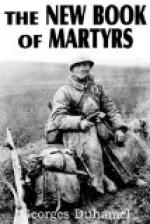“Don’t take any notice of those small things, they don’t do any harm. Only save me, and I will give you a beautiful piece of china or earthenware, whichever you like.”
III
The root of the evil is not so much the shattered leg, as the little wound in the arm, from which so much good blood was lost.
With his livid lips, no longer distinguishable from the rest of his face, and the immense black pupils of his eyes, the man shows a countenance irradiated by a steadfast soul, which will not give in till the last moment. He contemplates the ravages of his body almost severely, and without illusion, and watching the surgeons as they scrub their hands, he says in a grave voice:
“Tell my wife that my last thoughts were of her and our children.”
Ah! it was not a veiled question, for, without a moment’s hesitation, he allows us to put the mask over his face.
The solemn words seem still to echo through the ward:
“Tell my wife...”
That manly face is not the face of one who could be deceived by soft words and consoling phrases. The white blouse turns away. The surgeon’s eyes grow dim behind his spectacles, and in solemn tones he replies:
“We will not fail to do so, friend.”
The patient’s eyelids flutter—as one waves a handkerchief from the deck of a departing steamer—then, breathing in the ether steadily, he falls into a dark slumber.
He never wakes, and we keep our promise to him.
IV
A few days before the death of Tricot, a very annoying thing happened to him; a small excrescence, a kind of pimpel, appeared on the side of his nose.
Tricot had suffered greatly; only some fragments of his hands remained; but, above all, he had a great opening in his side, a kind of fetid mouth, through which the will to live seemed to evaporate.
Coughing, spitting, looking about with wide, agonised eyes in search of elusive breath, having no hands to scratch oneself with, being unable to eat unaided, and further, never having the smallest desire to eat—could this be called living? And yet Tricot never gave in. He waged his own war with the divine patience of a man who had waged the great world war, and who knows that victory will not come right away.
But Tricot had neither allies nor reserves; he was all alone, so wasted and so exhausted that the day came when he passed almost imperceptibly from the state of a wounded to that of a dying man.
And it was just at this moment that the pimple appeared.
Tricot had borne the greatest sufferings courageously; but he seemed to have no strength to bear this slight addition to his woes.
“Monsieur,” stammered the orderly who had charge of him, utterly dejected, “I tell you, that pimple is the spark that makes the cup overflow.”




